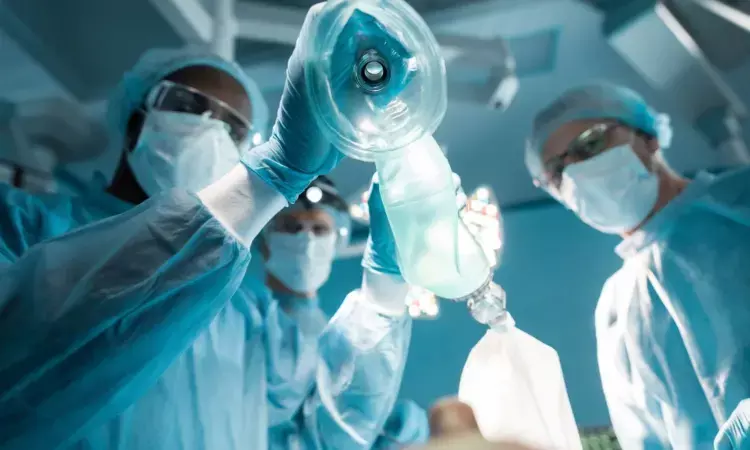- Home
- Medical news & Guidelines
- Anesthesiology
- Cardiology and CTVS
- Critical Care
- Dentistry
- Dermatology
- Diabetes and Endocrinology
- ENT
- Gastroenterology
- Medicine
- Nephrology
- Neurology
- Obstretics-Gynaecology
- Oncology
- Ophthalmology
- Orthopaedics
- Pediatrics-Neonatology
- Psychiatry
- Pulmonology
- Radiology
- Surgery
- Urology
- Laboratory Medicine
- Diet
- Nursing
- Paramedical
- Physiotherapy
- Health news
- Fact Check
- Bone Health Fact Check
- Brain Health Fact Check
- Cancer Related Fact Check
- Child Care Fact Check
- Dental and oral health fact check
- Diabetes and metabolic health fact check
- Diet and Nutrition Fact Check
- Eye and ENT Care Fact Check
- Fitness fact check
- Gut health fact check
- Heart health fact check
- Kidney health fact check
- Medical education fact check
- Men's health fact check
- Respiratory fact check
- Skin and hair care fact check
- Vaccine and Immunization fact check
- Women's health fact check
- AYUSH
- State News
- Andaman and Nicobar Islands
- Andhra Pradesh
- Arunachal Pradesh
- Assam
- Bihar
- Chandigarh
- Chattisgarh
- Dadra and Nagar Haveli
- Daman and Diu
- Delhi
- Goa
- Gujarat
- Haryana
- Himachal Pradesh
- Jammu & Kashmir
- Jharkhand
- Karnataka
- Kerala
- Ladakh
- Lakshadweep
- Madhya Pradesh
- Maharashtra
- Manipur
- Meghalaya
- Mizoram
- Nagaland
- Odisha
- Puducherry
- Punjab
- Rajasthan
- Sikkim
- Tamil Nadu
- Telangana
- Tripura
- Uttar Pradesh
- Uttrakhand
- West Bengal
- Medical Education
- Industry
Propofol or dexmedetomidine which is better for anesthesia maintenance in laparoscopic cholecystectomy?

Iran: Anesthesia maintenance by dexmedetomidine in comparison with propofol showed a significant difference in hemodynamic parameters in a recent study published in the journal Anesthesiology & Pain Medicine. Dexmedetomidine, however, had better effects on controlling hemodynamic parameters, and propofol was found to have better effects on decreasing stress hormones and thus can be suggested for laparoscopic cholecystectomy (LC) surgery.
General anesthesia induces immunologic, endocrine, and metabolic responses. Anesthetic drugs affect the endocrine system by modifying the level of stress hormones and hemodynamic variables of the patient. Ali Ghomeishi, Ahvaz Jundishapur University of Medical Sciences, Ahvaz, Iran, and colleagues aimed to compare the effects of propofol and dexmedetomidine on hemodynamic parameters and stress-induced hormones in laparoscopic cholecystectomy surgery.
The study included seventy patients of elective LC. They were randomly assigned in the ratio of 1:1 to receive propofol (75 µg/kg/min) and dexmedetomidine (0.5 µg/kg/hour) as anesthesia maintenance. Hemodynamic parameters (heart rate and mean atrial pressure), serum epinephrine, and blood sugar level were monitored and recorded from the pre-anesthesia period to 10 min after entry to the post-anesthesia care unit (PACU) according to a planned method.
Based on the study, the researchers found the following:
- Heart rate and mean atrial pressure changes were significantly lower in the dexmedetomidine group in all stages compared to the propofol group.
- The rises in blood glucose and serum epinephrine levels in the dexmedetomidine group were significantly higher than in the propofol group.
"Although epinephrine level was low in the propofol group, there was a significant difference in hemodynamic parameters," wrote the authors. This suggests future studding on the combination of dexmedetomidine propofol. Consistent hemodynamic and lack of significant difference in important factors could refer to monitoring depth anesthesia by BIS."
Reference:
Ghomeishi A, Mohtadi A R, Behaeen K, Nesioonpour S, Bakhtiari N, et al. Comparison of the Effect of Propofol and Dexmedetomidine on Hemodynamic Parameters and Stress Response Hormones During Laparoscopic Cholecystectomy Surgery. Anesth Pain Med. 2021;11(5):e119446. doi: 10.5812/aapm.119446.
Dr Kamal Kant Kohli-MBBS, DTCD- a chest specialist with more than 30 years of practice and a flair for writing clinical articles, Dr Kamal Kant Kohli joined Medical Dialogues as a Chief Editor of Medical News. Besides writing articles, as an editor, he proofreads and verifies all the medical content published on Medical Dialogues including those coming from journals, studies,medical conferences,guidelines etc. Email: drkohli@medicaldialogues.in. Contact no. 011-43720751


